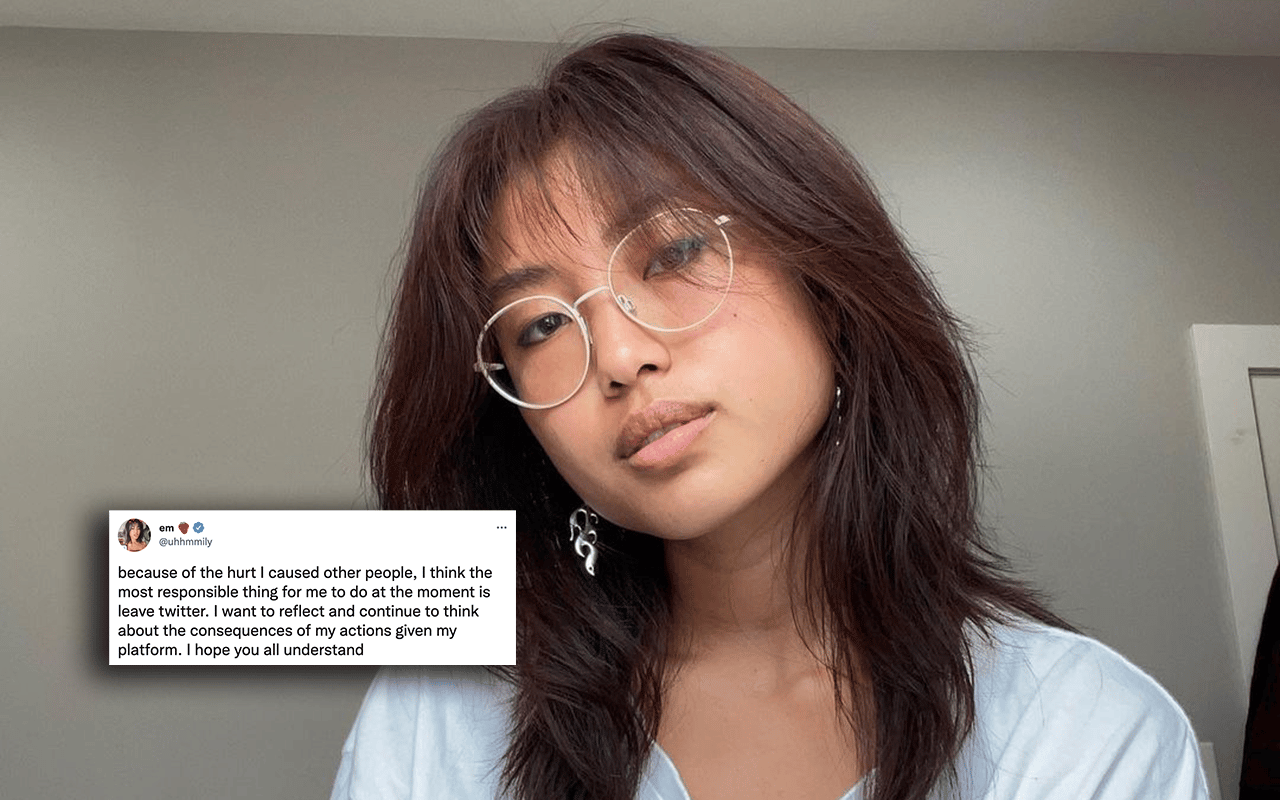
Creators, take note.
Vine star-turned-YouTuber ‘Not Even Emily’ is taking a temporary break from Twitter following backlash for her past comments on the highly publicised defamation trial between Johnny Depp and Amber Heard earlier this year.
Emily, who boasts over 539K subscribers on YouTube and over 150K followers on Twitter, was called out on September 30th after she made a post (rightfully) criticising white women for glamorising the murders of Jeffrey Dahmer off the back of the new Netflix series about the serial killer.
She tweeted her disdain for this “trend” alongside screenshots of white women on TikTok claiming to be unbothered or unphased by the series.
“There is a whole trend of white women on TikTok flexing how they were so “unbothered” and “unfazed” by the Dahmer series on Netflix,” she wrote. “If you find the depiction [of] heinous targeted murders of LGBT and black/brown people “not disturbing enough” then something is wrong with you”.
Emily continued: “There are literally so many other videos with captions similar to these and it’s disgusting. Dahmer isn’t a comic book character or some fictional person. He was a murderer and his victims should still be alive today. Screw all of y’all”.
One day later, a fan account for actress Amber Heard quote tweeted Emily’s thread, sharing screenshots of tweets the commentary creator had made about Heard and her allegations of abuse against ex-husband Johnny Depp over the years.
“You shouldn’t be preaching about it though,” the fan account wrote to Emily.
In 2019, Emily allegedly tweeted: “This whole thing with Amber Heard is seriously so disgusting. She really used a movement advocating for sexual abuse survivors to cover up her own abuse she perpetrated against her own husband? Completely heinous”.
During the trial earlier this year, she allegedly tweeted in support of Depp.
You shouldn’t be preaching about it though. https://t.co/lb6LnWfVjT pic.twitter.com/xH7LNUkJR8
— karlee (@resilientheard) September 30, 2022
On October 4th, Emily addressed her past tweets in a thread, saying that she wasn’t “properly educated” on Depp and Heard’s relationship, and was getting most of her information from TikTok and Twitter.
“I should have refrained from making any statements since I wasn’t actually following the trial, and could have been consuming a lot of misinformation to then spread more misinformation,” she wrote. “I am more aware about how things have played out and that Amber was vilified and I contributed to that vilification. I won’t say much more just because I really don’t know much about the trial and my mistake in the first place was speaking about something out of my scope”.
“Sorry everyone if I disappointed you, I really just didn’t know anything about Johnny Depp’s dating/romantic/abuse history so I shouldn’t have said anything at all,” she finished.
Though many fans welcomed her change of opinion on the matter, Emily announced today that she will be taking a hiatus from Twitter to “reflect on the consequences” of her actions given the size of her platform.
“Recently, tweets of mine were brought up in regards to Amber Heard and Johnny Depp. The tweets caused pain to many sexual assault/domestic violence victims and my initial apology was not enough,” she posted in a note on Twitter.
“I should have based my apology on my contribution to the actual situation not my unawareness of the situation, especially since I have a platform and made such a strong claim about a serious topic. I also should have taken more time to process the response to my initial statement before resuming to post as usual. I understand the response to my statement and why I was wrong.”
Emily went on to say that Amber was “publicly humiliated” during the trial and explained how Johnny’s “problematic and violent” behaviour did not face similar scrutiny despite “a lot of evidence”.
“This case was made into a spectacle and turned into entertainment only at Amber’s expense, which I contributed to with my tweets. There is an abundance of online content mocking her crying, struggling to answer questions in a way the public seems fit, (and let’s face it she would have been criticized no matter what) and recounting serious/horrific matters. Millions of comments all attacking Amber virtually none giving her an ounce of consideration despite evidence against her counterpart and the type of person he may be. A case involving DV/SA is not for people’s entertainment or an opportunity to blindly dogpile,” she continued.
She finished by apologising to Amber and other sexual assault and domestic violence survivors who were impacted by her “lack of regard, irresponsibility, and carelessness.”
“I want to publicly make an informed statement no matter the response. I do not want to let this “just blow over” considering the magnitude of the topic at hand and how much it hurts other victims,” she wrote. “I will promise to be more responsible in the future and always be open and receptive to those I hurt.”
Emily went on to include the screenshots of her past tweets in the thread as well as her original apology before announcing her break from Twitter.
“Because of the hurt I caused other people, I think the most responsible thing for me to do at the moment is leave Twitter. I want to reflect and continue to think about the consequences of my actions given my platform. I hope you all understand,” she tweeted separately.
“In the meantime while I’m gone, please remember to THINK before you speak, especially if you have any type of influence. Do not make the mistake that I made, because it will affect others more than you can understand in the moment.”
Survivors have flooded Emily’s mentions thanking the creator for such a thorough apology, noting that her acknowledgment of this “mistake” will help influence others to educate themselves on the realities of sexual assault and domestic violence.
Whether it was necessary for Emily to temporarily leave Twitter or not, there is no denying that her second apology is one of the best we’ve seen from an influencer, hitting the four main elements that make a good apology— acknowledging the harm caused, taking responsibility for those actions, expressing regret or remorse, and offering to make amends in a tangible way.
After her first apology failed to acknowledge how her pro-Depp tweets could have impacted public perception of sexual assault and domestic violence and in turn, caused harm to survivors, Emily did not delete her tweets or shy away from the backlash. Rather, she listened to feedback, remained open to learning about the harm she caused and why her first apology was not “good enough”, acknowledged its shortcomings, and explained all of this in detail to her audience before offering a genuine apology with actionable steps.
While her apology is only for survivors to accept, Emily’s handling of this situation proves that growth and positive change are possible, even in the face of ‘cancel culture.’
Influencers can take genuine accountability for their actions.
It’s just that most of the time, they don’t want to.
- Centennial Teamhttps://centennialworld.com/author/centennialbeauty/
- Centennial Teamhttps://centennialworld.com/author/centennialbeauty/
- Centennial Teamhttps://centennialworld.com/author/centennialbeauty/
- Centennial Teamhttps://centennialworld.com/author/centennialbeauty/


